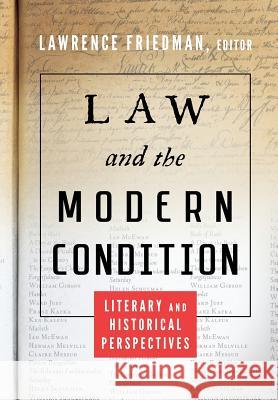Law and the Modern Condition: Literary and Historical Perspectives » książka
Law and the Modern Condition: Literary and Historical Perspectives
ISBN-13: 9781616193911 / Angielski / Twarda / 2013 / 284 str.
xv, 266 pp. Using fiction as a lens through which to view particular developments in the law, each of the essays in this book discusses a work of literary fiction - some classical (the tale of Ruth in the Bible, the fiction of Franz Kafka and Herman Melville, the plays of William Shakespeare), some modern (the post-September 11 fiction of William Gibson, Ken Kalfus, Claire Messud, Ian McEwan and Helen Schulman) - that concerns, directly or indirectly, the historical development of the law. This exploration of legal history through fiction pays particular attention to its relevance to our present circumstances and our growing concerns about terrorism and civil liberties.
Each essay considers the legal lessons about the fictional event or events at its core, lessons that tell us something worth remembering as we continue to chart law's evolution. These lessons, like those that may be found in all great literature, necessarily extend beyond the historical confines of the characters and plot and background of each story to embrace the modern condition - which, as these great stories suggest, is and always has been the only condition.
"These provocative, scholarly essays range from the Bible to a look at how tomorrow's technology may influence fundamental social organization with many startling stops in between - Lady Macbeth, Kafka, Napster and post 9/11 fiction to name a few. Friedman's choices help the reader view the transit of law and culture through novel, sometimes unforgettable, dimensions."
-- Michael Meltsner, Matthews Distinguished University Professor, Northeastern Law School and author of The Making of a Civil Rights Lawyer.
"The stories examined here brilliantly reflect worlds imagined by literature that speak to the modern condition: worlds steeped in law, worlds where law is refracted through complex orderings, and worlds where law seems virtually absent. All eloquently express the power of law to shape and unshape our realities within the modern condition.
The authors examine the law's role within a wide range of literary and historical texts. This volume remembers our deeply missed colleague George Dargo, and builds on his prolific examination of law in the context of biblical texts and the works of Herman Melville and Franz Kafka. Three of his elegantly written articles are included here. Lawrence Friedman's intricately researched essays reveal continuities, within the legal imaginary, between the novel at the height of its power in the nineteenth century and cutting-edge postmodern fiction in the post-9/11 world. Carla Spivack rounds out the volume with essays that take a fresh look at property rights and law, not normally viewed as the most scintillating of subjects. She engages in a fascinating exegesis of Shakespeare's Hamlet, and in her other articles provides bold insights from feminist, gender and queer studies. "
-- Tawia B. Ansah, Associate Dean for Academic Affairs, Professor of Law, FIU, College of Law.
LAWRENCE FRIEDMAN received his bachelor of arts in history from Connecticut College and holds law degrees from Boston College Law School and Harvard Law School. A member of the faculty at New England Law Boston, he has written widely in the areas of constitutional law, national security law, and law and literature. His previous books include The Massachusetts State Constitution (with Lynnea Thody) and The Case for Congress: Separation of Powers and the War on Terror (with Victor Hansen).











